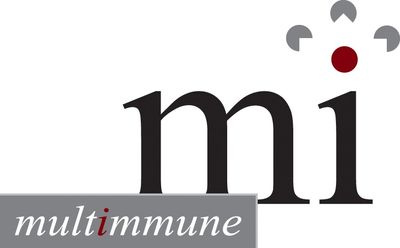

- Home
- Companies
- multimmune GmbH
- Products
- multimmune - Model ENKASTIM-ev - Active ...
multimmune - Model ENKASTIM-ev - Active Cellular Immunotherapies (ACIs)
ENKASTIM-ev is an innovative product candidate representing a new class of therapy known as Active Cellular Immunotherapies (ACIs). ACI is a treatment approach which capitalizes on the power of vital human cells to re-engage the patient`s own immune system to fight cancer. The product induces a targeted immune response against surface-bound heat shock protein 70 (Hsp70). Surface-bound Hsp70 is a tumor-specific marker which is expressed on about 50-75% of various cancer entities, eg lung, colon, breast, pancreas.
Ex vivo stimulation of ENKASTIM-ev, an Hsp70-based GMP-grade synthetic peptide comprising 14 amino acids (14mer, TKD), results in a specific activation of NK cells with targeting and killing ability towards membrane Hsp70-positive tumors and metastases.
Approach: Immune effector cells are obtained from patients by blood collection (leukapheresis). NK cells are incubated in culture bags (ex vivo) with Hsp70 peptide / Interleukin-2 for several days in a closed system. Following quality control and sterility testing the therapeutic is delivered as an intravenous infusion.
Status: The efficiency of ex vivo stimulated effector cells in killing tumors has been demonstrated in pre-clinical mouse models and in patients with colorectal and lung carcinomas.
Phase I Clinical Pilot Study: Feasibility and safety of ENKASTIM-ev (ex vivo), has been proven in patients with colorectal and lung carcinomas in a Phase I Clinical Pilot Study at the University Hospital of Regensburg (Krause et al, 2004).
Phase II Clinical Study: A randomized multi-center Phase II clinical trial in patients with Stage IIIb inoperable non small lung cell carcinoma (NSCLC) following radio (chemo) therapy (follow links on right for description of trial) has demonstrated that ENKASTIM-ev delivered clinical benefit in 5 out of 7 patients (71%; median Progression Free Survival (PFS) 13 months; including one patient who left the trial after 15 months PFS - see Case Study below), with one complete response. This contrasts with 2 out of 7 patients (28%, median PFS 8 months) deriving clinical benefit from the radio (chemo) therapy alone in the control group (Multhoff et al., 2020) .
